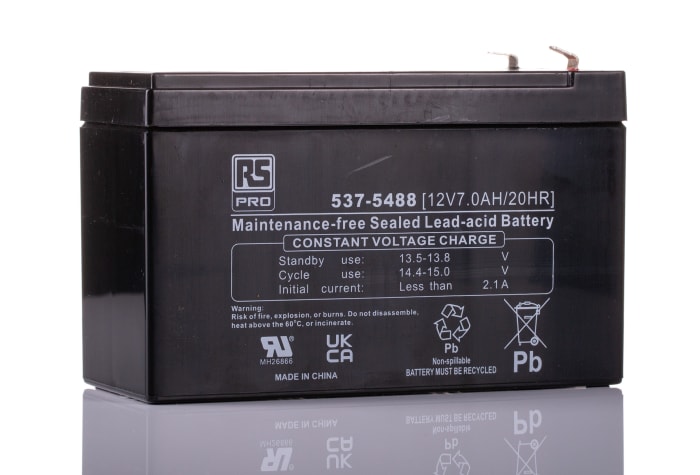Технически документи
Спецификации
Brand
PanasonicCapacity
7.2Ah
Nominal Voltage
12V
Construction
AGM
Terminal Type
Faston F1
Flame Resistant
No
Dimensions
94 x 64.5 x 151mm
Designed for Cyclic Application
No
Designed High Rate Application
No
Eurobat Classification
6 to 9 Years
Operating Temperature Range
-15 → +50°C
Weight
2.5kg
Страна на произход
China
Детайли за продукта
Lead Acid Rechargeable, Panasonic
This high performance Panasonic battery is specially designed as your back up when the mains power is lost or you experience a blackout. The high quality rechargeable sealed lead acid battery ensures that no electrolyte leakages occurs from the case or terminals. This battery has a long running time of 6 to 9 years and is optimally usable in standby parallel operation.
With AGM technology, you can be sure that the battery is sealed and maintenance free. The plates are rigidly mounted to withstand extensive shock and vibration.
Features and Benefits
Absorbed Glass Matt (AGM) technology with no free acid
High durability with with 6 to 9 years
Long service life with low self-discharge
Recyclable
Typical Applications
Alarm Systems
Communication Equipment
Emergency Lighting
Fire and Security Systems
FAQ's
GEL Vs AGM Lead Acid Batteries
AGM (Absorbed Glass Mat)
These batteries contain only enough liquid to keep the specially designed glass mat wet. The glass mat is made to wick the battery electrolytes between the battery plates. If the AGM battery is broken no free liquid leaks out.
AGM batteries are preferred when a large amount of amps are required. The life expectancy remains excellent in most cases, if they are not discharged more than 60% between recharges and/or recharged fully every 3-6 months.
Gel Cell Batteries
These batteries contains silica type gel, which is a thick paste like material. It allows the electrons to flow between plates, but will not leak in a gel battery if the case is broken.
Gel Cell Batteries don't offer the same power capacity as do the same physical size as AGM batteries. Gel cell batteries excel in slow discharge rates and slightly higher operating temperatures and with excellent deep cycle capability. Recharging these batteries must be done correctly or it will suffer a premature failure.
Are Lead Acid Rechargeable Batteries Harmful?
Lead acid batteries contain chemicals that have the potential to be harmful to both your health and the environment. They contain lead which is a highly toxic metal and sulfuric acid which is a corrosive electrolyte solution. Proper handling procedures must be followed at all times.
How to dispose of Lead Acid Batteries?
These batteries do contain hazardous chemicals so recycling is the only way to dispose of them.
Recycle responsibly. A wide range of schemes are available.
Lead Acid Rechargeable, Panasonic
Запитване за цена
1
Запитване за цена
Информацията за складовите наличности временно не е налична.
1
Информацията за складовите наличности временно не е налична.
Технически документи
Спецификации
Brand
PanasonicCapacity
7.2Ah
Nominal Voltage
12V
Construction
AGM
Terminal Type
Faston F1
Flame Resistant
No
Dimensions
94 x 64.5 x 151mm
Designed for Cyclic Application
No
Designed High Rate Application
No
Eurobat Classification
6 to 9 Years
Operating Temperature Range
-15 → +50°C
Weight
2.5kg
Страна на произход
China
Детайли за продукта
Lead Acid Rechargeable, Panasonic
This high performance Panasonic battery is specially designed as your back up when the mains power is lost or you experience a blackout. The high quality rechargeable sealed lead acid battery ensures that no electrolyte leakages occurs from the case or terminals. This battery has a long running time of 6 to 9 years and is optimally usable in standby parallel operation.
With AGM technology, you can be sure that the battery is sealed and maintenance free. The plates are rigidly mounted to withstand extensive shock and vibration.
Features and Benefits
Absorbed Glass Matt (AGM) technology with no free acid
High durability with with 6 to 9 years
Long service life with low self-discharge
Recyclable
Typical Applications
Alarm Systems
Communication Equipment
Emergency Lighting
Fire and Security Systems
FAQ's
GEL Vs AGM Lead Acid Batteries
AGM (Absorbed Glass Mat)
These batteries contain only enough liquid to keep the specially designed glass mat wet. The glass mat is made to wick the battery electrolytes between the battery plates. If the AGM battery is broken no free liquid leaks out.
AGM batteries are preferred when a large amount of amps are required. The life expectancy remains excellent in most cases, if they are not discharged more than 60% between recharges and/or recharged fully every 3-6 months.
Gel Cell Batteries
These batteries contains silica type gel, which is a thick paste like material. It allows the electrons to flow between plates, but will not leak in a gel battery if the case is broken.
Gel Cell Batteries don't offer the same power capacity as do the same physical size as AGM batteries. Gel cell batteries excel in slow discharge rates and slightly higher operating temperatures and with excellent deep cycle capability. Recharging these batteries must be done correctly or it will suffer a premature failure.
Are Lead Acid Rechargeable Batteries Harmful?
Lead acid batteries contain chemicals that have the potential to be harmful to both your health and the environment. They contain lead which is a highly toxic metal and sulfuric acid which is a corrosive electrolyte solution. Proper handling procedures must be followed at all times.
How to dispose of Lead Acid Batteries?
These batteries do contain hazardous chemicals so recycling is the only way to dispose of them.
Recycle responsibly. A wide range of schemes are available.


